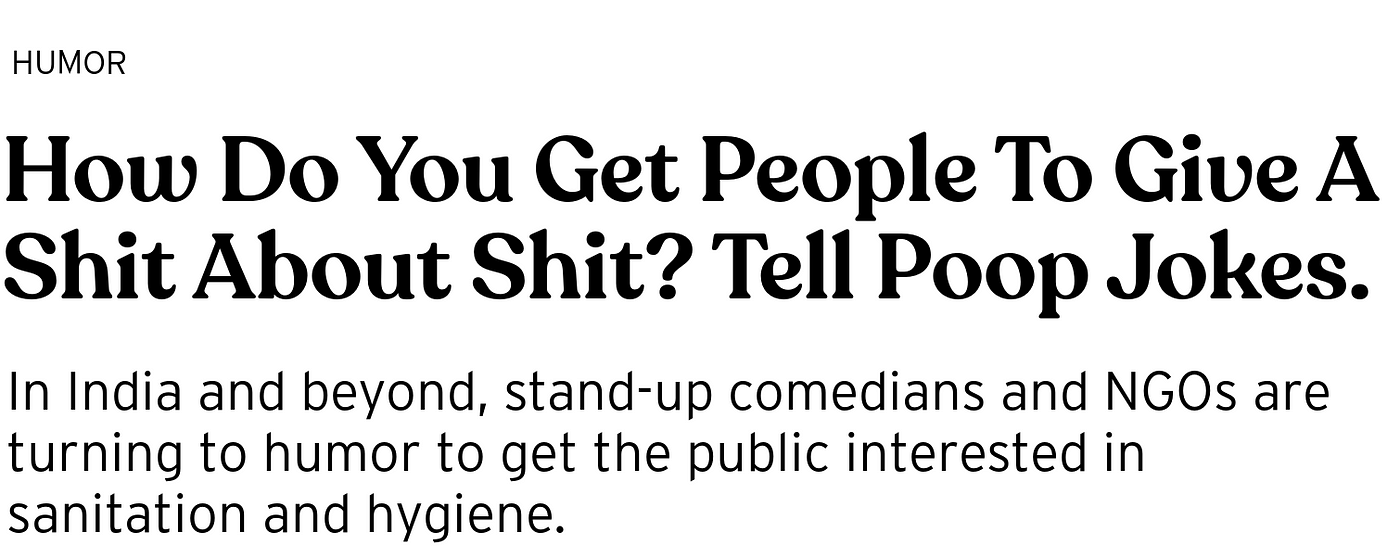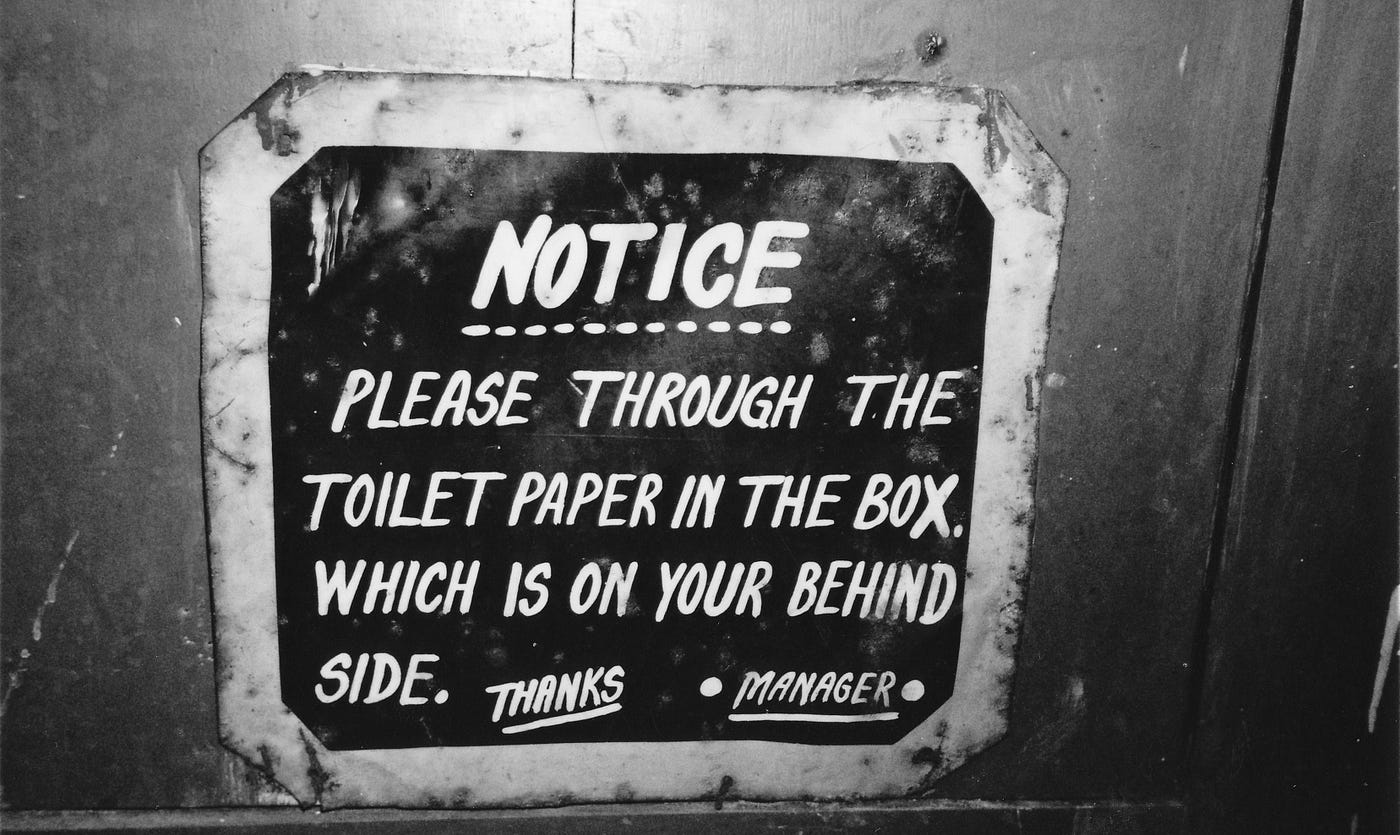Poop Is Funny People Wake Up



"T The title of the national toilet rightfully belongs to the Indian railway system. Correct. Because you cannot go to work in the morning without seeing at least a thousand anonymous bums gleaming in the morning sunlight. They're sitting there with their back towards you, because obviously they can't see you, you can't see them, apparently. And it struck me, like statistically, out of the 300 faces that you see in a day, you've probably already seen the asses of two people. That's why when you see someone talking through their ass, you're like, 'Wait, you look familiar.'"
This bit, charmingly titled "A Thousand Gleaming Bums," comes from Mumbai-based stand-up comedian Aditi Mittal. Mittal is no stranger to mining humor out of water, sanitation, and hygiene (WASH, in NGO-speak). She's also waxed comedic about sanitary pads and menstruation.
This isn't just about leaning into gross-out comedy (although there is a part of Mittal that delights in busting taboos). As Mittal told me, she sees a social significance to comedy that tackles topics that normally spark outrage, disgust, or shame.

Comedians like Mittal are funny, but the stats aren't. Inadequate sanitation is associated with a host of social problems, from girls dropping out of school when they reach puberty, to children and adults dying of diarrheal diseases.
Around the world, 2.4 billion people lack access to improved sanitation, or facilities that hygienically separate feces from human contact. Nearly a billion practice open defecation, or pooping in the open — with their "gleaming bums" available for the world to see.
India is often referenced in discussions of sanitation and global health, partly because open defecation occurs on a much larger scale there than in any other country. As Sarah Bell, a water systems lecturer at University College London, pointed out in an email,
"In India, more people have access to mobile phones than toilets. In some parts of the world it is easier to share cat videos on Facebook than it is to find a safe place to do a poo. That's completely nuts."
There's a tragic human cost to insufficient sanitation, of course. But the toll on economies and health resources can also be measured. Waterborne diseases are responsible for patients occupying about half of all hospital beds. Improved sanitation could lower rates of diarrheal diseases by over 30%. And it's estimated that a single dollar on sanitation could lead to economic gains of $10, largely due to the productive time gained.
Yet the funding landscape looks pretty dismal. Global commitments for water, sanitation and hygiene (WASH) spending decreased by over $2 billion from 2012 to 2015, though the current Sustainable Development Goal targets for sanitation (including universal access to safe sanitation by 2030) are more ambitious than previous ones.
 I It's odd that something so universal is still so shrouded in misinformation and shame. "Sanitation researchers often complain that the issues don't get the attention they deserve because shit is taboo, it is dirty and disgusting and no one wants to talk about it," explained Bell. "Except that everyone does. Once you start talking to people about toilets they won't shut up…It is a curious thing that on a personal level everyone wants to talk about toilets, but on a political level it's hard to get traction.
I It's odd that something so universal is still so shrouded in misinformation and shame. "Sanitation researchers often complain that the issues don't get the attention they deserve because shit is taboo, it is dirty and disgusting and no one wants to talk about it," explained Bell. "Except that everyone does. Once you start talking to people about toilets they won't shut up…It is a curious thing that on a personal level everyone wants to talk about toilets, but on a political level it's hard to get traction.
"So maybe we need to start with the personal, to allow people to giggle and squirm and connect with our most basic bodily functions, and then to use that as a way to access the bigger political issues."
In India, many comedians and sanitation campaigns have recently embraced the shit talk. Mittal's "A Thousand Gleaming Bums" segments is a "poop story" aired in the documentary series Stand Up Planet. Another stand-up video that tackles Indian trains and uncomfortable pooping situations is "The Train Toilet Experience" from Naveen Richard, and the East India Company produced "The Sanitation Solution."
"I'll be honest," said Mittal. "For a long time, I didn't think that open defecation was a problem…It's very much a part of our reality." Lack of toilet access is so ubiquitous that it leads to a paradox: "It's so normalized that you don't talk about it."
The toilet humor is starting to go worldwide as well. WaterAid's senior media officer Laura Crowley explained to me the strategic way that her organization uses comedy: "We recognize not everyone can or wants to engage with the same frankness around sanitation. With such taboo issues, there are two ways to go — shock or humor. We had to get over the 'ick' factor and reach people not wanting to get engaged with the issue, so humor works well. Which is why we use humor quite a lot, whether it is someone dressed up as a giant turd or imagining what would happen if men had periods."
This line of thinking led to "It's No Joke," a WaterAid campaign that's been used to draw attention to World Toilet Day. It's No Joke activities have included collecting and voting on toilet jokes from comedians, running a comedy festival, and encouraging supporters to host their own comedy quizzes to raise money. The organization has also created short films titled "If Men Had Periods" and "Period Dramas" to raise awareness of menstruation management.
According to Crowley, using humor has multiple benefits. Journalists are less squeamish about reporting on sanitation. Researchers and development professionals are able to cultivate more attention to their work. Donations and engagement with campaigns (e.g. petition-signing) increase. And even when it comes to that elusive question of whether social media campaigns actually reach policymakers, Crowley argues that "decision makers don't spend their spare time exclusively reading blogs on international development, but behave like everyone else. They too want to see funny content and share jokes with friends."
Poop jokes aren't only for NGOs and stand-up comedians; at scientific conferences, Bell has often shared this joke, which she learned from her grandmother:
Did you hear about the constipated mathematician?
He worked it out with a pencil.
Bell has an analytical performance style, which is perhaps appropriate for an academic. "I get my biggest laughs by saying absurd things using serious, controlled delivery," she said. "I've asked people to mentally follow their poo from the toilet in the theatre, out of the building, under the street, across the city to the sewage treatment works."
Bell is also reflective about the purposes of this type of comedy. "Finding humor in sanitation is pretty easy," she noted. "What is more difficult is making that bridge from child-like poo jokes to the serious absurdity of the sanitation crisis. It is never OK to laugh at the powerless. People who live without decent sanitation cannot be the butt of bad poo jokes."
This aligns with Mittal's philosophy when writing jokes: "the difference is between punching up and punching down."
With this focus on "punching up," it can be argued that comedy is democratizing…but only up to a point. The stand-up comedy scene in India, to take one example, is still largely the domain of the urban classes. According to Mittal, "It's more opinion-based, which is a very, very dangerous thing in India right now."
It's also dangerous to fall into the trap of congratulating ourselves on how urbane we are in our knowledge, how broad-minded we are in our appetite for comedy, and feeling like something has been accomplished. But support for a worthwhile NGO, political pressure, more sharing of stories from people who are directly affected by poor sanitation, perhaps even just an anecdote for a tired politician to sprinkle into a speech…these may not be transformative, but they're something.
In this era of development fatigue, and given how exhausting outrage can be, comedy is a way to keep things fresh. Even when the subject matter stinks.

Source: https://brightthemag.com/how-do-you-get-people-to-give-a-shit-about-shit-tell-poop-jokes-616627c6d4f8
0 Response to "Poop Is Funny People Wake Up"
Post a Comment